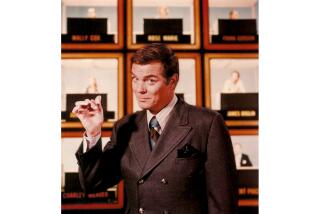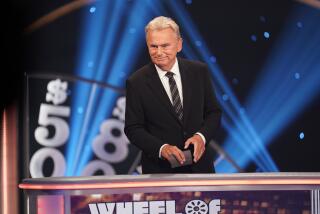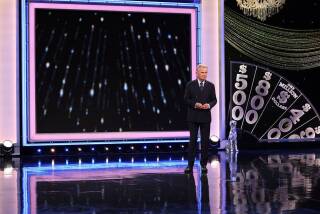Host of ‘Dotto,’ one of first programs involved in TV quiz-show scandals
Jack Narz, the host on “Dotto” when it became one of the first television programs ensnared in the quiz-show scandals of the 1950s and who went on to emcee “Concentration” and other game shows, died Wednesday. He was 85.
Narz, brother of veteran game show host Tom Kennedy, died of complications of a stroke at Cedars-Sinai Medical Center in Los Angeles, a family spokesman announced.
While lined up to get tickets for a Broadway show on a Friday night in 1958, Narz was paged to the telephone. On the line was a spokesman for “Dotto” sponsor Colgate-Palmolive, who told him that CBS had determined the daytime show was rigged and that it would not air the next Monday. The version that aired nights on NBC also was pulled.
Narz was as surprised as anybody by the show’s sudden cancellation, Steve Beverly, a game-show expert and professor of broadcasting at Union University in Tennessee, told The Times on Wednesday.
“Jack was called to give a deposition before the grand jury investigating. He passed the polygraph test and was completely exonerated,” said Beverly, who became a close friend.
Before he testified, Narz said he was “unaware” of the game-show cheating, Narz recalled in a 1990 interview with The Times.
“While we were on the air, one of the future contestants on the show went through a woman’s purse in the contestants’ dressing room,” he said. “While going through the purse, he discovered someone had given her some answers.”
Narz said he had never met the standby contestant who charged that another contestant received answers in advance. On the show, contestants won the right to connect the dots and try to identify a famous figure by answering questions correctly.
The abrupt cancellation of “Dotto” in August 1958 helped trigger a widespread investigation of the game-show industry that revealed rigging to be rampant.
Almost all prime-time quiz shows were taken off the air. Congress held full-scale hearings in 1959 and federal regulations of quiz shows were instituted.
Game show hosts from that era -- including Narz -- were little more than hired guns who showed up about half an hour before the live broadcast and ran through the material, Beverly said. They were not tightly connected to the producers, many of whom fixed the game shows to heighten the drama.
Although Narz would host several more game shows, he told Beverly on more than one occasion: “I always felt that I was a ‘day late and dollar short’ kind of guy. From that point on, that maybe there were some shows I didn’t get because they said, ‘He was on that show, maybe we shouldn’t take a shot on him.’ ”
Narz may have been best known for hosting the mid-1970s remake of “Concentration,” which filmed 195 shows -- a season’s worth -- in nine weeks. The schedule left plenty of time for him to golf, which he did at least three times a week, Beverly said.
Among the other game shows Narz hosted were “Video Village,” “Seven Keys” and a syndicated version of “Beat the Clock” that debuted in 1969.
“He was the Dean Martin of game-show hosts. . . . because he was so easygoing, so smooth . . . when you saw him on the air, you felt he was a guest in your home,” Beverly said. “He never overpowered his shows . . . . He was a textbook example of what an emcee ought to be.”
Narz and Kennedy were the only brothers to make their living primarily as game-show hosts, according to Beverly.
Kennedy, who hosted “Name That Tune” in the 1970s, changed his name from Jim Narz to avoid being confused with his older brother, whom he followed into the business.
Jack Narz was born Nov. 13, 1922, in Louisville, Ky. He served as a military pilot during World War II.
After military service, he broke into radio at a station in El Centro, Calif., and worked for several stations before landing a job as an announcer on television’s “Queen for a Day,” which led to a spot on the popular 1950s children’s science-fiction program “Space Patrol.”
“Narz is fondly remembered by many baby boomers as the announcer who got us to scarf down cereal that tasted like cardboard so we could get box-top premiums for ’25 cents in coin,’ ” Jean-Noel Bassior, author of the 2005 book “Space Patrol: Missions of Daring in the Name of Early Television,” told The Times in an e-mail.
In addition to his brother, Narz is survived by his wife of 39 years, Delores “Dodo” Vaiksnor; his children from his first marriage, John, Michael and David Narz and Karen Ferretti; six grandchildren; two great-grandchildren; and a sister, Mary Lovett Scully.
Instead of flowers, the family suggests donating to the American Cancer Society, www.cancer.org.
--
More to Read
The complete guide to home viewing
Get Screen Gab for everything about the TV shows and streaming movies everyone’s talking about.
You may occasionally receive promotional content from the Los Angeles Times.







